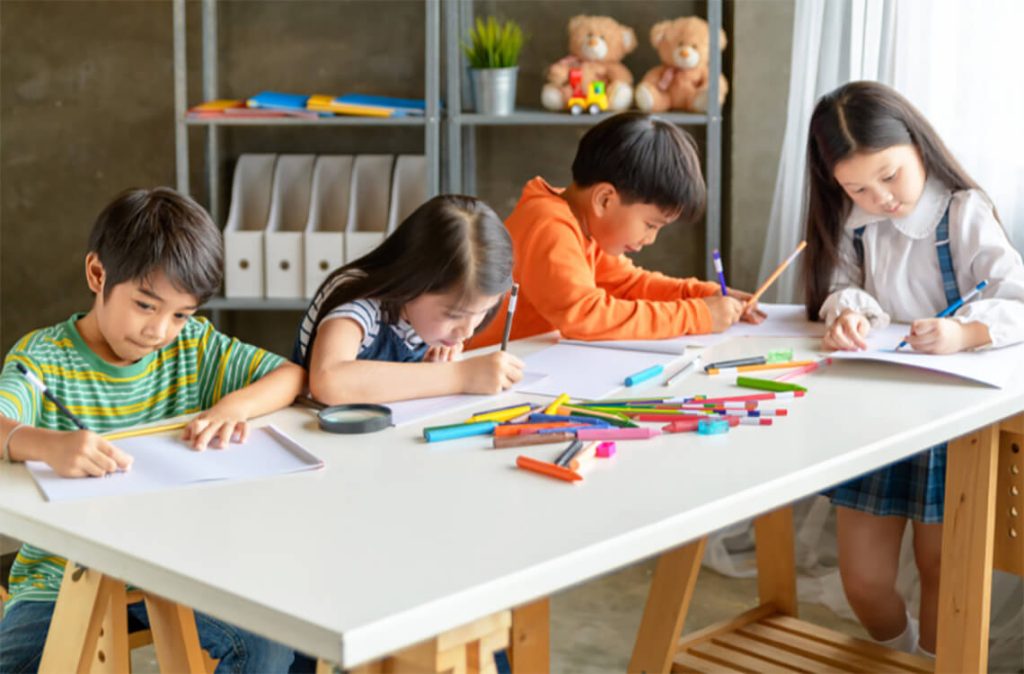There has been a notable shift in the realm of education in recent years as more parents in Malaysia are exploring unconventional learning paths for their children.
Traditional schooling systems are being challenged by alternative approaches that prioritise creativity, self-discovery, and a genuine love for learning.
If you want more for your child other than conventional, classroom education, here are a some of the more popular types of alternative education in Malaysia that you may consider.
5 Types of Alternative Childhood Education
Montessori
The most popular form of alternative education practiced in Malaysia, the Montessori method, was coined by Dr Maria Montessori.
It focuses on a child-centered approach that encourages independence and self-direction in learning.
This method focus on hands-on activities and personalised learning plans.
Children are encouraged to explore their interests at their own pace, cultivating a sense of curiosity and a love for learning.
Benefits of Montessori Method
Hands-On Learning: The Montessori classroom is filled with materials, knick-knacks and objects to encourage participative learning and sensorial education.
Self-Directed Exploration: Children have the freedom to choose activities that interest them, promoting a sense of independence, responsibility, and self-motivation.
Focus on Practical Life Skills: Activities such as pouring, dressing, and cleaning not only help foster independence but also fine and gross motor skills.
Waldorf
Also widely practiced in Malaysia, the Waldorf education was inspired by the philosophy of Rudolf Steiner, known for its holistic approach to learning through artistic activities, movement, and a connection to nature.
Waldorf schools in Malaysia focus on more than just nurturing academic skills.
Creative, emotional, and social education are also integral.
The Waldorf education strives to create well-rounded individuals capable of critical thinking and problem-solving.
Benefits of Waldorf Education
Emphasis on Creativity: The arts, including music, painting, and storytelling, are integrated into the curriculum.
Play-Based Learning: The method recognises the importance of imaginative play in a child’s cognitive and social development.
No Early Formal Testing: Waldorf schools typically avoid formal testing in the early years, allowing students to learn without the pressure of standardised assessments.
Delayed Introduction to Technology: Focuses on encouraging children to create direct experiences with the natural world.
Reggio Emilia
Originated from a town in northern Italy with the same name, the Reggio Emilia approach is known for its philosophy of the ‘limitless child’.
Kids are viewed as infinitely capable and curious creatures, full of potential and wisdom.
Therefore, children are active participants in this educational philosophy.
Benefits of Reggio Emilia Method
Child-Centered Learning: a strong emphasis on the child’s interests, curiosities, and innate abilities.
Environment: The physical environment plays a crucial role. Classrooms are designed to be aesthetically pleasing and to inspire exploration.
Project-Based Learning: Learning in the Reggio Emilia approach often takes the form of projects. These projects are based on the interests of the children and can last for an extended period.
Forest Schooling
Another alternative education that has recently gained popularity in Malaysia is forest schooling.
Also known as forest kindergarten, nature school or nature-based education, forest schooling takes the classroom off campus and into the great outdoors.
It involves learning in natural environments, often forests or other natural settings such as gardens or parks.
Forest schooling hands-on, experiential learning, and encourages a connection with nature.
Benefits of Forest Schooling
Creativity and Imagination: Children can to explore and engage with nature in an unstructured way, promoting healthy imagination and creativity.
Physical Health: Outdoor activities in a forest setting like climbing, running, and exploring uneven terrain promote physical fitness, coordination, and motor skills.
Resilience and Independence: Forest schooling often involves overcoming challenges in a less controlled environment. This fosters resilience, confidence, adaptability, and a sense of independence in children.
Unschooling
A form of homeschooling, unschooling is an informal approach to early education where kids learn through their own interests and curiosities rather than following a set curriculum.
Unlike the previous two methods, unschooling involves active participation from parents to help ‘create’ their child’s learning systems from scratch through an experimental ‘trial-and-error’ method.
Benefits of Unschooling
Tailored Learning: Unschooling allows for a personalised and flexible approach to education. Children can explore their interests and passions, leading to a more individualised learning experience.
Reduced Stress: Advocates argue that unschooling can reduce stress associated with traditional schooling, such as academic pressures, standardised testing, and social expectations.
Parent-Child Bonding: Being directly involved in your child’s learning forms strong bonds. Foster empathy, cooperation and freedom.
Challenges and Considerations of Alternative Education
Acceptance in Mainstream Society
Alternative education methods may face challenges in gaining acceptance within the broader society, including recognition by higher education institutions and employers.
Educator Training
Many of these alternative education methods require specialised training for teachers and educators, which may be available in the country.
Parental Involvement
Many alternative education approaches require a high level of parental involvement, which may not be feasible for all families.
Assessment and Evaluation
The lack of traditional assessments and grades in some alternative methods raises questions about how children’s progress is measured and communicated.
Embracing Alternative Education
Alternative learning paths like Montessori, Waldorf, unschooling and others, are gaining more popularity in Malaysia.
With so many of these schools popping up everywhere, parents are beginning to value the role of creative play, explorative learning and child-centred education in their kids’ learning experience.
While these approaches may be met with challenges, alternative education has great potential to expand how we raise and educate our children.
All it takes is more awareness and acceptance and we’re on our way towards revolutionising the rigid landscape of early childhood education for years to come.
Good luck deciding on the best route for your child, my fellow parents!
Disclaimer: The information provided in this article is for informational purposes only and should not be considered as medical advice from Motherhood. For any health-related concerns, it is advisable to consult with a qualified healthcare professional or medical practitioner.
For more insightful stories and fun recipes, stay tuned to Motherhood Story!
